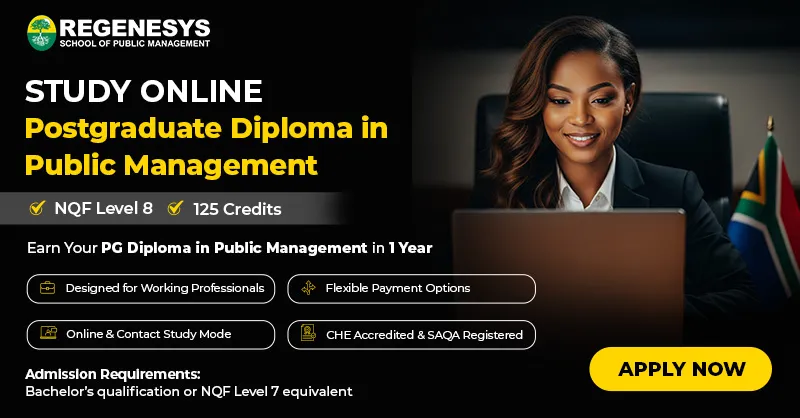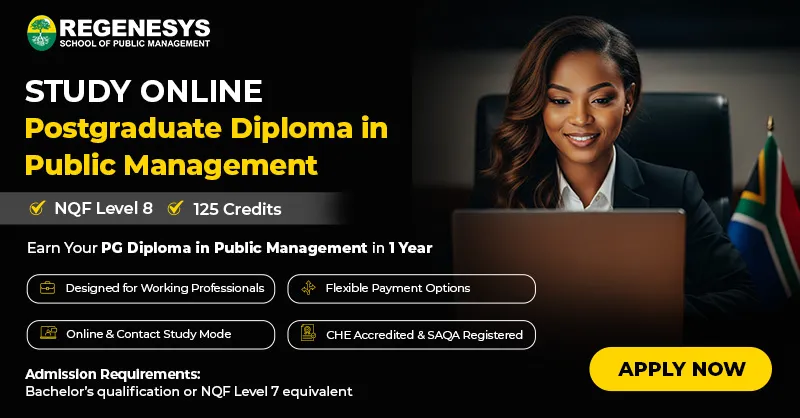Are you considering a career in public management that offers diverse specialisations and a solid foundation in leadership and administration? The Postgraduate Diploma in Public Management (PDPM) at Regenesys School of Public Management might be the catalyst for your professional aspirations.
The PG Postgraduate Diploma in Public Management is designed to equip individuals with a comprehensive understanding of public sector management, governance, and leadership principles. This programme caters to individuals aspiring to enhance their skills in public administration and contribute meaningfully to the dynamic field of public service.
Table of Contents
- Understanding PDPM
- Benefits of Specialisation in PDPM
- Career Opportunities
- Regenesys School of Public Management:
- FAQS

Understanding PDPM
The Postgraduate Diploma in Public Management is an intensive one-year programme that delves deep into various facets of public management. It covers modules such as:
- Negotiation and Conflict Management: Equips students with the skills to handle conflicts effectively within public sector environments.
- Labour Relations: Focuses on the relationship between employers, employees, and the government, crucial for a smooth functioning public sector.
- Quality and Customer Service Management: Emphasises the significance of quality service delivery within public institutions.
- Change Management: Explores strategies for implementing effective changes within public sector organisations.
- Education Curriculum Management: Covers aspects of managing educational programmes and curricula within the public sector.
- Mentoring and Coaching: Equips individuals with skills in mentoring and coaching, essential for leadership roles.
Benefits of Specialisation in PDPM
Specialisation within the realm of public management offers numerous benefits, providing individuals with focused expertise and tailored skills that are crucial in navigating the complexities of the public sector. Here are some key benefits:
Enhanced Expertise
Specialising in a particular area within public management allows individuals to deepen their knowledge and proficiency in that specific field. This expertise equips them to handle complex challenges and make informed decisions, contributing significantly to their effectiveness within their chosen specialisation.
Career Advancement
Specialised skills are highly sought-after in the job market. By acquiring expertise in a specific area of public management, individuals increase their chances of securing higher-level positions and advancing their careers within governmental institutions or related sectors. Employers often value specialised knowledge, considering it a valuable asset in addressing specific organisational needs.
Increased Relevance and Value
Being specialised enhances an individual’s relevance and value within the public sector. Mastery in a particular domain enables professionals to offer unique insights, innovative solutions, and targeted strategies, thereby making substantial contributions to the organisation’s success and objectives.
Problem-Solving Abilities
Specialisation fosters a deeper understanding of the intricacies and nuances within a particular aspect of public management. This in-depth knowledge equips professionals with sharper problem-solving skills, enabling them to tackle challenges more effectively and devise creative solutions tailored to the specific demands of their specialisation.
Adaptability and Flexibility
While specialising, individuals often acquire transferable skills that can be applied across different contexts within the public sector. This adaptability and flexibility enable them to pivot and apply their expertise to various situations, making them versatile assets within their organisation.
Influence and Leadership
Specialised professionals often become influential leaders within their domain. Their expertise commands respect and positions them as thought leaders, allowing them to drive change, influence policies, and guide the direction of their specialisation within the public sector.
Personal and Professional Growth
Engaging in specialised studies fosters continuous learning and growth. It encourages individuals to stay updated with the latest trends, research, and best practices within their chosen field, ensuring ongoing personal and professional development.
Overall, specialisation within public management empowers individuals to become highly skilled, sought-after professionals capable of making substantial contributions, leading impactful initiatives, and driving positive change within the complex landscape of the public sector.

Choosing Electives
As part of the programme, students have the opportunity to select two elective modules. These electives allow students to tailor their learning experiences to suit their career goals. Let’s delve deeper into each elective module offered within the Postgraduate Diploma in Public Management programme at Regenesys School of Public Management:
Negotiation and Conflict Management
This elective focuses on honing the skills required to navigate and resolve conflicts effectively within the context of public management. Students learn negotiation tactics, mediation techniques, and conflict resolution strategies vital for fostering collaboration and maintaining stability within public sector environments. Understanding the dynamics of conflict and mastering negotiation skills are pivotal for effective decision-making and maintaining harmony in diverse workplaces.
Labour Relations
Labour relations form the bedrock of a functioning public sector. This module explores the intricate relationships between employers, employees, and governmental bodies. Students delve into the legal frameworks, policies, and practices governing labour relations, equipping them with the knowledge to foster productive relationships and navigate potential conflicts within the realm of employment laws.
Quality and Customer Service Management
In an era where service delivery and customer satisfaction are paramount, this elective focuses on instilling skills essential for maintaining high standards of service within public institutions. Students explore methodologies for quality assessment, customer-centric approaches, and effective service delivery strategies tailored to meet the diverse needs of the public. Understanding and implementing quality management principles are crucial for enhancing the credibility and efficiency of public services.
Change Management
Change is inevitable, especially in dynamic public sector environments. This module equips students with the expertise to manage and implement change effectively within governmental institutions. Students learn change management theories, strategies for overcoming resistance to change, and frameworks for facilitating smooth transitions. Mastery in change management is essential for driving innovation, adapting to evolving circumstances, and ensuring sustainable growth within the public sector.
Education Curriculum Management
Managing educational programmes within public institutions demands specialised skills. This elective provides insights into curriculum development, instructional design, and educational leadership within the public sector. Students learn to navigate educational policies, implement effective teaching methodologies, and manage educational resources, contributing to the enhancement of educational programmes within governmental organisations.
Mentoring and Coaching
Effective leadership is the cornerstone of successful public management. This module focuses on honing leadership skills through mentoring and coaching techniques. Students learn to inspire and guide teams, foster talent, and cultivate a culture of continuous improvement within public sector organisations. Developing effective mentoring and coaching skills is pivotal for nurturing future leaders and fostering a conducive work environment.
Career Opportunities
Upon completing the Postgraduate Diploma in Public Management, graduates can explore diverse career opportunities in the public sector. Roles may include:
- Public Sector Manager: Overseeing various operations within government agencies or departments.
- Policy Analyst: Evaluating policies and providing insights to improve public service.
- Public Relations Officer: Managing communications and relationships between the public sector and the community.
- Programme Coordinator: Overseeing the implementation of various programmes within public institutions.
- Human Resource Manager: Managing human resources within government organisations.
Regenesys School of Public Management:
Regenesys School of Public Management offers a comprehensive and industry-relevant curriculum. With a focus on practical skills and theoretical knowledge, the school ensures that students are equipped to excel in the ever-evolving public management landscape.
The school’s faculty comprises seasoned professionals and experts in public management, offering students a wealth of practical insights and real-world experiences. The programme encourages critical thinking, problem-solving, and effective decision-making, preparing graduates for leadership roles in the public sector.
The PG Postgraduate Diploma in Public Management at Regenesys School of Public Management is a gateway to a rewarding career in public service. Find out more about this programme and kickstart your journey towards a successful career in public management.
For further details about the programme and admission requirements, visitRegenesys School of Public Management.
FAQS
1. What is the duration of the Postgraduate Diploma in Public Management (PDPM)?
The PDPM programme is an intensive one-year course designed to equip individuals with comprehensive knowledge and skills in public sector management.
2. Can I pursue this programme while working full-time?
Yes, the flexible structure of the PDPM programme at Regenesys School of Public Management allows individuals to balance their studies with their professional commitments.
3. Are there prerequisites for enrolling in the PDPM programme?
Typically, applicants are expected to possess a relevant undergraduate degree or equivalent professional experience. Specific admission requirements can be found on the Regenesys School of Public Management’s website.
4. How many elective modules can I choose as part of the PDPM programme?
Students have the option to select two elective modules from a range of specialised subjects offered within the programme.
5. What career opportunities are available after completing the PDPM programme?
Graduates can explore various roles in the public sector, such as Public Sector Manager, Policy Analyst, Public Relations Officer, Programme Coordinator, and Human Resource Manager, among others.







